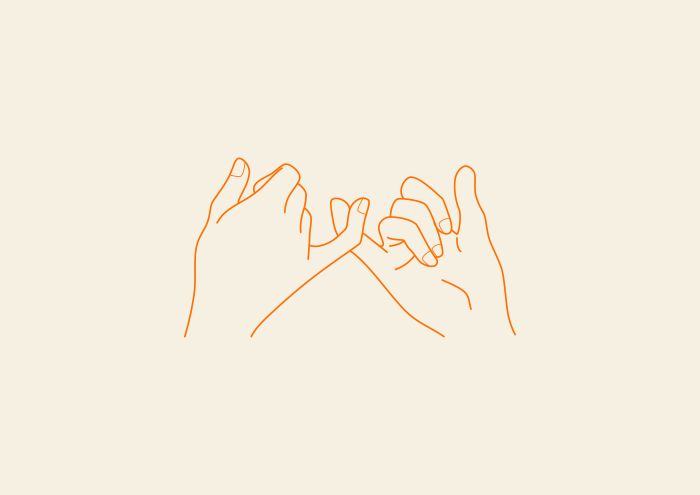Charlie (25) has endometriosis: ‘my endometriosis is always there'
“My friends experienced cramps during their periods as well, so I assumed my ten-day period with heavy abdominal cramps was completely normal.”
Charlie was twelve when she first had her period and experienced blood loss and intense abdominal cramps. “My period defined my daily life. I set my alarm at night to clean up. My mother couldn’t bring enough Feminax pills before they ran out again. To make things worse, I also did ballet and had to train in a leotard for sixteen hours a week. This was not exactly an ideal hobby for someone who is always afraid to have their period unexpectedly due to an irregular cycle. As time went on, the intensity and duration of my periods kept increasing, eventually my mom decided it was high time to visit a doctor. I went to my GP and was referred to gynecologist Maddy Smeets to talk about my symptoms. During my first visit - I was fourteen at the time - it was bullseye. My symptoms seemed to indicate I had endometriosis. However, the endometriosis caused my pelvis to contract, therefore, the gynecologist was unable to perform a colposcopy. As a result, the gynecologist was unable to give an exact diagnosis. To alleviate the symptoms somewhat, my gynecologist decided to prescribe the pill. This allowed me to regulate and delay my periods myself.”
The different stages of endometriosis
Read more
Diagnosis
It wasn’t until much later that Charlie was diagnosed with endometriosis, because she postponed her visit to the gynecologist for years. “In retrospect, I regret this decision. At that point I’d gotten used to the pain interfering with my life and had taught myself to deal with it. I also was, I think, subconsciously afraid of the answers I would get at the gynecologist. It wasn't until my mother heard that I still hadn't had a colposcopy yet that I mustered up the courage to call the endometriosis clinic for an appointment." Charlie has since been diagnosed with endometriosis. Her left ovary is adhered to her uterus. As a result, Charlie's pelvic floor muscles can no longer relax and she experiences severe cramps. This is a common problem in endometriosis patients. In such cases, seeing a pelvic floor physiotherapist may help.
‘Suffering from abdominal cramps? Skip sex’
“Relaxing your pelvis is very important. Take sex, for example. The first time hurts for most girls, but if you are still in pain after a couple of times, something isn’t right. Guidance from a pelvic floor specialist might help in this case. My pelvic floor specialist, Catherine van der Grijp, recommended acupuncture to me. I also learned breathing techniques to practice how to relax my pelvis. In addition, it’s very important to listen to your body and to be honest with your partner. Are you experiencing abdominal cramps even before you have sex? Skip sex. Sex should be enjoyable and it’s not if you end up crying in pain afterwards."
the most important causes of pain during sex
Read here
Pain relief
“Since I was diagnosed, I’ve been on the mini pill (progesterone-only pill). I have to keep taking the pill until I break through. Now, this occurs every three months on average. Even though my periods are still no party, the pills do help a little. I was also given an endometriosis diet, in which I have to avoid gluten, sugar, caffeine, soy, dairy products, meat, alcohol and ready-made meals in order to keep the pain to a minimum. In this stage of my life, where I am exploring the world, such a strict diet is not going to work for me. But if the pain becomes so severe that I can no longer function, I’m sure I’ll be willing to try and stick to it.”
Desire to have children
When Charlie is asked the question if she is less fertile, she shrugs her shoulders. “When I first got diagnosed with endometriosis, I was twenty and having children was not one of my priorities. I didn’t specifically ask, but this might also be because I was scared of the answer. I was told that endometriosis will always grow back, so surgery would only make sense if I want to have children. Thinking about it now, I’d advise people to ask these ‘difficult’ questions anyways. Who knows, I might be pregnant tomorrow and I’d have so many unnecessary uncertainties to consider.”
‘One in ten women suffer from endometriosis.’
Charlie finds it nothing but natural for her to tell her story. “It is important for girls to know that they are not alone and that they should visit a doctor if they experience any symptoms. Statistics don’t lie, one in ten women suffer from endometriosis. I was lucky that my mom was so vigilant, but enough women walk around endlessly with various conditions without knowing what is wrong with their bodies. Endometriosis is always there: so even on vacation, during a ballet performance, or at the beach in summer. Recently, I’ve started waking up 15 minutes earlier in the morning - the time I experience the most pain - so that I have plenty of time to give myself some extra attention. I take a long hot shower and slowly dress myself. Pain is going to gnaw at you psychologically in the long run. Women need to learn that they don't have to take pain for granted and to take care of their bodies in the best way possible."
Linda (48) has severe endometriosis
Read moreWant to read more about endometriosis? Click here.



























